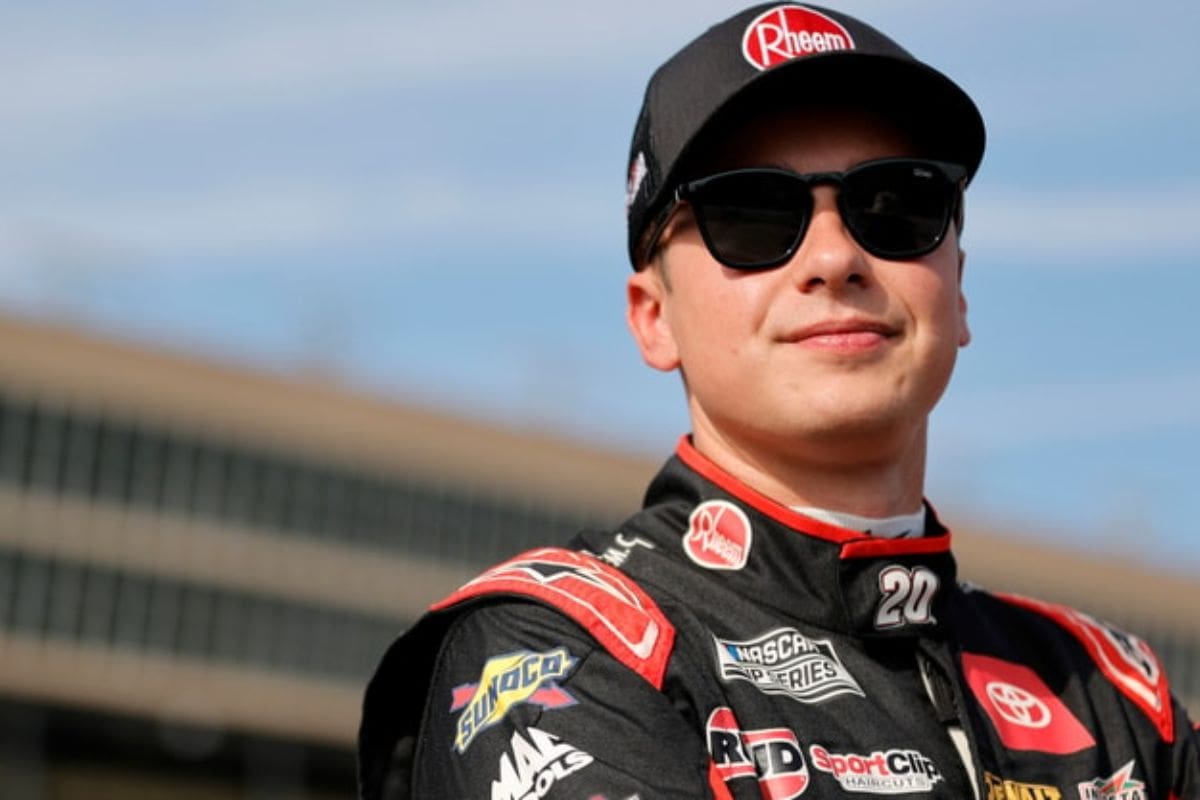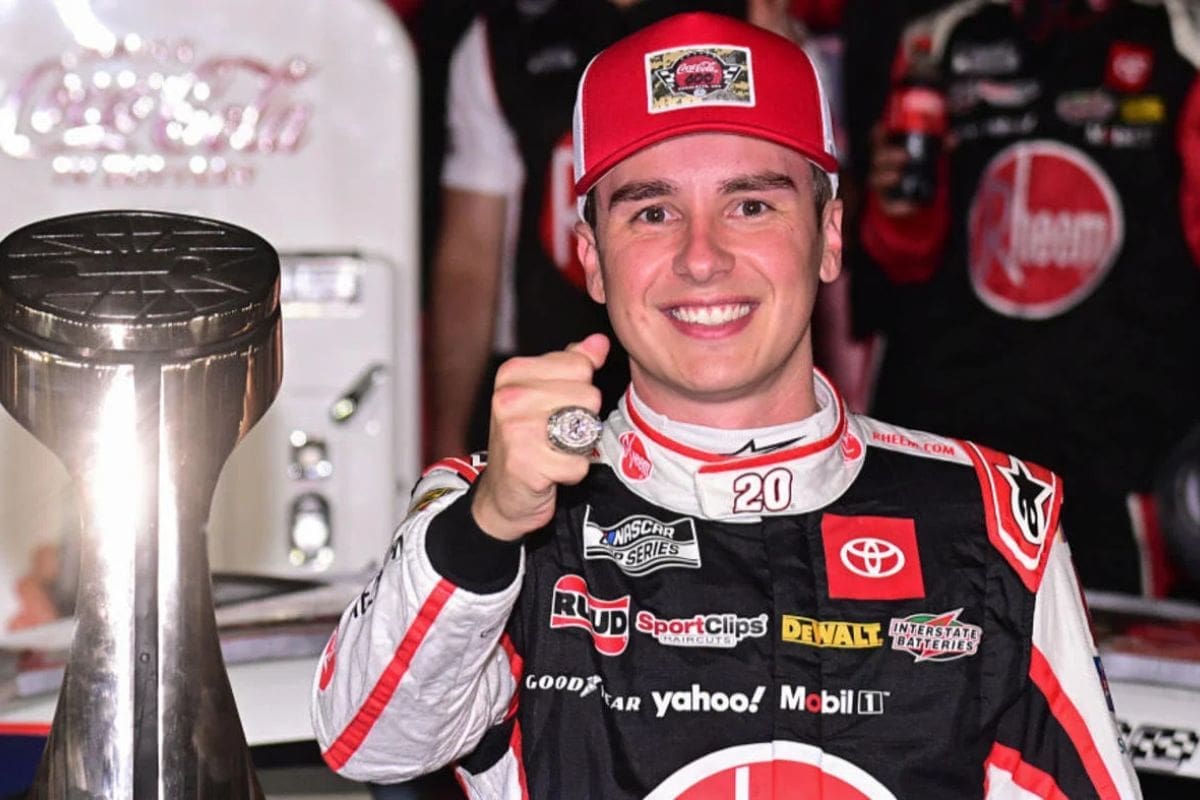Christopher Bell’s Surprising Take Despite Gateway: Christopher Bell‘s performance at Gateway was tainted by mechanical failures, yet his post-race commentary offers valuable insights into his mindset and approach. While the weekend’s outcome was far from ideal, Bell’s ability to remain optimistic and emphasize the significance of consistency and reliability highlights a mature perspective. This attitude not only aids his personal growth but also positively impacts team dynamics and morale. To grasp how Bell’s reflections might influence the team’s future strategies and performance, it is crucial to take into account his analysis of both the race and his role within the team.
Key Highlights
- Christopher Bell maintained a positive outlook despite the mechanical failure at Gateway.
- Bell highlighted the team’s strong performance and stage win as key takeaways.
- Emphasized the importance of equipment reliability in future races.
- Bell’s resilience and optimism boost team morale despite setbacks.
- Recognized the need for adaptability and strategic intelligence in overcoming race challenges.
Race Overview and Context
The Gateway weekend marked a clear demonstration for Christopher Bell, who had recently achieved victory in a rain-shortened race but struggled to secure a top-5 finish due to challenging conditions. Bell’s performance at the previous event, where he clinched a win due to the race being called off while he was in the lead, had set high expectations. However, the dynamics at Gateway proved to be particularly different.
In the context of NASCAR’s demanding schedule, races often present a variety of unforeseen challenges that test the adaptability of drivers and their teams. The Gateway race was no exception, with weather conditions and track variables significantly affecting performance outcomes. Despite bringing the same speed that had secured his prior victory, Bell encountered obstacles that thwarted his attempts to replicate his success.
The race unfolded under a cloud of unpredictability, with several drivers facing similar adversities. Ryan Blaney, another prominent competitor, also failed to make it into the top-5, highlighting the race’s difficulty. Such scenarios are not uncommon in motorsports, where external factors can sometimes overshadow even the most preparations and strategies.
Bell’s inability to break into the top-5 at Gateway serves as a demonstration of the inherently volatile nature of racing. It emphasizes the importance of consistency, resilience, and the need for contingency planning. While the disappointing finish at Gateway might be seen as a setback, it also provides valuable insights into the complexities of race dynamics and the continuous pursuit of excellence in the face of adversities.

Stage 1 Performance
Christopher Bell’s performance in Stage 1 highlighted his potential, as he outmaneuvered Michael McDowell in a thrilling final lap move to secure a stage victory. This decisive move not only displayed Bell’s driving skills but also solidified his position as a serious contender early in the race. As the No. 20 Toyota surged past McDowell, Bell demonstrated a combination of strategic intelligence and raw speed, setting a tone of dominance.
In analyzing Bell’s strategy, it is important to note his ability to maintain composure under demanding circumstances. The final laps of Stage 1 were filled with competition, yet Bell’s precision in maneuvering through the pack and timing his move on McDowell was impeccable. This performance was a reflection of his expertise in reading the race dynamics and anticipating his rivals’ actions.
Furthermore, the car’s performance during this stage was remarkable. The No. 20 Toyota displayed a balance of speed and handling, allowing Bell to execute his strategies effectively. The vehicle’s responsiveness enabled him to make critical passes and defend his position against seasoned competitors.
Bell’s Stage 1 victory also had significant implications for his standing in the race. Securing the stage win not only provided valuable points but also boosted his momentum. It suggested that Bell was well-prepared to contend for higher honors as the race progressed.
Mechanical Issues
Mechanical issues plagued Bell’s race as the No. 20 Toyota’s engine began to falter, leading to a notable drop in power and ultimately costing him the lead. As the race neared its end, Bell, who had been dueling with Ryan Blaney for the win, experienced a drastic reduction in engine performance. This mechanical setback not only dashed his hopes for victory but also allowed Austin Cindric to capitalize on the situation, eventually securing his second career NASCAR Cup Series win.
- Importance of Equipment Reliability: In a sport where fractions of a second can determine outcomes, the reliability of a vehicle’s components is essential. Bell’s engine issue is a stark reminder that even the most carefully prepared cars can falter, affecting race dynamics and results.
- Team Readiness: While driver skill is vital, the role of the engineering and pit crew in anticipating and mitigating potential mechanical failures cannot be overstated. The inability to preemptively address or rectify Bell’s engine trouble brings attention to areas needing improvement within the team.
- Impact on Championship Standings: Mechanical failures have far-reaching consequences beyond a single race. For Bell, the loss of potential points due to this issue could greatly affect his position in the championship standings, emphasizing the need for consistent mechanical reliability throughout the season.

Bell’s Struggles and Team Efforts
Facing a critical moment, Bell’s struggles on the track were compounded by the team’s relentless efforts to troubleshoot and adapt in real-time. With only 18 laps remaining, Bell’s car began to lose significant power, trailing behind Blaney. The warning came over the radio as Bell announced, ‘I’m blowing up. It’s game over.’ This stark declaration sent the No. 20 team into overdrive, determined to mitigate the rapidly unfolding disaster.
Crew chief Adam Stevens, an experienced tactician, immediately sought solutions. He advised Bell to adjust his shifting timing, hoping that minor alterations could stave off further performance degradation. However, despite these efforts, the car’s speed continued to plummet, losing nearly a moment per lap. Stevens and his crew had to balance the urgency of the situation with calculated decisions, knowing that any misstep could exacerbate the mechanical failure.
The situation highlighted the intricacies of motorsport engineering and the critical role of in-race communication. The team’s ability to provide real-time diagnostics and potential fixes is paramount in such high-stakes environments. Unfortunately, even with their expertise and coordinated efforts, the mechanical issues proved insurmountable.
Post-Race Reactions and Reflections
Reflecting on the Gateway weekend, Bell’s post-race reactions revealed both frustration over the mechanical failure and a surprisingly optimistic outlook on the team’s collective performance. Despite leading 79 laps and winning the initial two stages, an unforeseen engine problem dashed his hopes of securing a consecutive victory. Bell’s honest admission of not sensing any issues before the breakdown highlights the unpredictable nature of mechanical failures in motorsports.
Bell’s post-race comments to FS1 highlighted his mixed emotions. While he could not conceal his disappointment, he also praised the team’s efforts in preparing a highly competitive car.
“Yeah, I mean, it’s a huge accomplishment for the overall weekend, you know, we showed up with a great race car. It was super fast and put ourselves in position. If we can keep bringing race cars like this…” – bell
- Performance Consistency: Leading 79 laps and winning two stages indicate that Bell and his team have the capability to dominate races. This performance consistency is crucial as the season progresses.
- Mechanical Reliability: The unexpected engine failure serves as a reminder of the importance of mechanical reliability. Addressing these issues will be vital for future success.
- Team Morale and Resilience: Despite the setback, Bell’s positive attitude can enhance team morale. His focus on the positives suggests a resilient mindset, essential for overcoming challenges in the high-stakes world of racing.
Detailed Performance and Track Strategy
Christopher Bell’s display at Gateway highlighted not only his raw speed but also his strategic intelligence, particularly evident in his adept use of the outside line in corners to maintain a competitive edge. Christopher Bell’s ability to adapt and innovate on the track was a key factor in his impressive early rise from P4 to leading by lap 41, culminating in an initial-stage victory.
Christopher Bell’s strategy was particularly notable during the subsequent stage, where evolving race dynamics and perfectly timed cautions created a challenging environment. His decision to utilize the outside line in corners allowed for more aggressive passing and better positioning, enabling him to regain the lead and secure valuable playoff points. This adaptability was a reflection of his keen understanding of Gateway’s unique characteristics, as he noted in a pit road interview.
“Yeah, I mean, they got a hidden gem here in St. Louis. Really, really cool—you can move around, you can make passes.” – bell
Heading into the final stage, Christopher Bell’s strategic insight continued to shine. He remained a constant threat to Ryan Blaney, particularly during the last round of pit stops where Bell was poised for a decisive play. Although an unfortunate engine failure dashed his hopes of victory, his performance up to that point highlighted a mastery of track strategy.

News in Brief: Christopher Bell’s Surprising Take Despite Gateway
Despite the setbacks experienced at Gateway, Christopher Bell’s positive outlook and focus on team performance and consistency highlight the importance of resilience in motorsports. His ability to emphasize both achievements and challenges reflects a mature perspective that can boost team morale and foster a culture of perseverance.
Christopher Bell’s approach serves as a valuable example of how maintaining a balanced view can contribute to long-term success in the competitive environment of racing.
Also Read: Christopher Bell Admits Larson’s Talent, Shares Outside Interests
